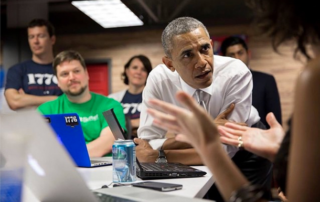President Obama’s odd economic campaign message
President Obama’s economic campaign message is odd. Here is what he’s saying at most campaign events.
-
“There’s almost no economic measure by which we’re not doing better than we were when I took office.”
-
“But people are still anxious. And they’re anxious for three reasons.”
- Overseas uncertainty: ISIL + ebola + Russia/Ukraine;
- “Although the economy is doing better, wages and incomes have not gone up. And the vast majority of growth, productivity increases, profits, wealth has accrued to folks at the very top of the economic pyramid, and we have not seen wages and incomes for ordinary folks go up for a couple of decades. And that makes people feel, even if things have gotten better, that they’re still concerned about not only their future but their children’s futures.”
- “[T]here’s a sense that things simply don’t work in Washington, and Congress, in particular, seems to be completely gridlocked.”
While true, his first point is a self-centered perspective for someone whose job this month is to support the reelection of his party’s Congressional candidates. If President Obama were running for re-election it might be important to compare today’s economy to that when he first took office. But your typical Democratic candidate for Congress isn’t running on President Obama’s economic record, and that six year time frame is irrelevant to candidates like Michelle Nunn and Alison Lundergran Grimes who have not been part of the past six years of governance+stalemate in DC. President Obama’s analysis centers on progress made during his tenure, while many Democratic Congressional candidates want this campaign to be about anything other than him.
President Obama also implies that because the economy is stronger than it was six years ago it is strong today. That does not necessarily follow, especially given the depth of the 2008-2009 recession. The U.S. economy has been climbing out of that hole for five years but it still has a long way to go.
From the President’s perspective, voters feel economic anxiety principally (only?) because of the decades-long maldistribution of economic growth. But if these distributional trends have been building for decades then it is unlikely they can explain a recent change in sentiment.
I suggest instead that voters’ economic anxiety is justified.
- In my judgment the U.S. economy is still quite weak (I won’t get into a statistical cherry-picking battle here) and voters know or can sense it. It can of course […]
